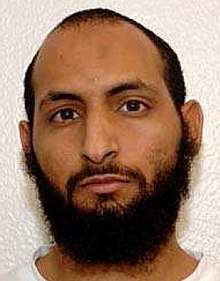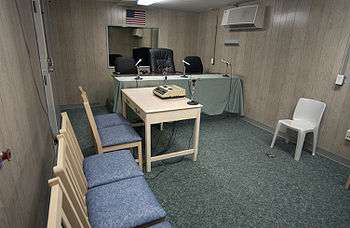Mahmoud Abd Al Aziz Abd Al Mujahid
Mahmoud Abd Al Aziz Abd Al Mujahid is a Yemeni citizen who was held in extrajudicial detention in the United States Guantanamo Bay detainment camps, in Cuba, for over fourteen and a half years, from January 11, 2002, to August 15, 2016.[1][2] His Guantanamo Internment Serial Number is 31. Joint Task Force Guantanamo analysts report that he was born on August 1, 1977, in Taiz. Yemen.
| Mahmud Abd Al Aziz al-Mujahid | |
|---|---|
 | |
| Released | 2016-08-15 United Arab Emirates |
| Citizenship | Yemen |
| Detained at | Guantanamo |
| ISN | 31 |
| Charge(s) | extrajudicial detention |
He arrived in the first cohort of twenty individuals who opened the prison.[2] The Guantanamo Joint Review Task Force classed him as a "forever prisoner", in 2009.[3][4] He was transferred to United Arab Emirates, with fourteen other men, on August 15, 2016.[5][6]
Official status reviews
Originally, the Bush Presidency asserted that captives apprehended in the "war on terror" were not covered by the Geneva Conventions, and could be held indefinitely, without charge, and without an open and transparent review of the justifications for their detention.[7] In 2004, the United States Supreme Court ruled, in Rasul v. Bush, that Guantanamo captives were entitled to being informed of the allegations justifying their detention, and were entitled to try to refute them.
Office for the Administrative Review of Detained Enemy Combatants

Following the Supreme Court's ruling the Department of Defense set up the Office for the Administrative Review of Detained Enemy Combatants.[7][10]
Scholars at the Brookings Institution, led by Benjamin Wittes, listed the captives still held in Guantanamo in December 2008, according to whether their detention was justified by certain common allegations:[11]
- Mahmoud Abd Al Aziz Abd Al Mujahid was listed as one of the captives who "The military alleges ... are associated with Al Qaeda."[11]
- Mahmoud Abd Al Aziz Abd Al Mujahid was listed as one of the captives who "The military alleges that the following detainees stayed in Al Qaeda, Taliban or other guest- or safehouses."[11]
- Mahmoud Abd Al Aziz Abd Al Mujahid was listed as one of the captives who "The military alleges ... took military or terrorist training in Afghanistan."[11]
- Mahmoud Abd Al Aziz Abd Al Mujahid was listed as one of the captives who "The military alleges ... fought for the Taliban."[11]
- Mahmoud Abd Al Aziz Abd Al Mujahid was listed as one of the captives who "The military alleges ... were at Tora Bora."[11]
- Mahmoud Abd Al Aziz Abd Al Mujahid was listed as one of the captives whose "names or aliases were found on material seized in raids on Al Qaeda safehouses and facilities."[11]
- Mahmoud Abd Al Aziz Abd Al Mujahid was listed as one of the captives who "The military alleges that the following detainees were captured under circumstances that strongly suggest belligerency."[11]
- Mahmoud Abd Al Aziz Abd Al Mujahid was listed as one of the captives who "The military alleges ... served on Osama Bin Laden’s security detail."[11]
- Mahmoud Abd Al Aziz Abd Al Mujahid was listed as one of the captives who was an "al Qaeda operative".[11]
- Mahmoud Abd Al Aziz Abd Al Mujahid was listed as one of the captives who had "denied all the government allegations."[11]
Al Mujahid chose to participate in his Combatant Status Review Tribunals.[12]
Formerly secret Joint Task Force Guantanamo assessment
On April 25, 2011, whistleblower organization WikiLeaks published formerly secret assessments drafted by Joint Task Force Guantanamo analysts.[13][14] His ten-page Joint Task Force Guantanamo assessment was drafted on March 8, 2008.[15] It was signed by camp commandant Rear Admiral Mark H. Buzby. He recommended continued detention.
References
-
OARDEC. "List of Individuals Detained by the Department of Defense at Guantanamo Bay, Cuba from January 2002 through May 15, 2006" (PDF). United States Department of Defense. Archived (PDF) from the original on 2007-09-30. Retrieved 2006-05-15.

- Margot Williams (2008-11-03). "Guantanamo Docket: Mahmoud Adb al Aziz Abd al Mujahid". New York Times. Retrieved 2016-08-17.
-
Carol Rosenberg (2013-06-17). "FOAI suit reveals Guantanamo's 'indefinite detainees'". Miami Herald. Archived from the original on 2014-11-21. Retrieved 2016-08-18.
The Miami Herald’s Carol Rosenberg, with the assistance of the Media Freedom and Information Access Clinic at the Yale Law School, filed suit in federal court in Washington D.C., in March for the list under the Freedom of Information Act. The students, in collaboration with Washington attorney Jay Brown, represented Rosenberg in a lawsuit that specifically sought the names of the 46 surviving prisoners.
- Carol Rosenberg (2013-06-17). "List of 'indefinite detainees'". Miami Herald. Archived from the original on 2016-04-11. Retrieved 2016-08-18.
- Benjamin Wittes (2016-08-16). "A Big Guantanamo Transfer: Progress Towards the Site's Obsolescence". Lawfare.
-
Camila Domonoske (2016-08-16). "15 Guantanamo Bay Detainees Transferred To United Arab Emirates". National Public Radio.
Two of the Afghan prisoners — Mohammed Kamin and Obaidallah, who only has one name — had been briefly charged in a military commission, The Miami Herald reports. The war crimes prosecutor dropped those charges.
-
"U.S. military reviews 'enemy combatant' use". USA Today. 2007-10-11. Archived from the original on 2012-08-11.
Critics called it an overdue acknowledgment that the so-called Combatant Status Review Tribunals are unfairly geared toward labeling detainees the enemy, even when they pose little danger. Simply redoing the tribunals won't fix the problem, they said, because the system still allows coerced evidence and denies detainees legal representation.
- Guantánamo Prisoners Getting Their Day, but Hardly in Court, New York Times, November 11, 2004 - mirror Archived 2007-09-30 at the Wayback Machine
- Inside the Guantánamo Bay hearings: Barbarian "Justice" dispensed by KGB-style "military tribunals", Financial Times, December 11, 2004
- "Q&A: What next for Guantanamo prisoners?". BBC News. 2002-01-21. Archived from the original on 24 November 2008. Retrieved 2008-11-24.
- Benjamin Wittes; Zaathira Wyne (2008-12-16). "The Current Detainee Population of Guantánamo: An Empirical Study" (PDF). The Brookings Institution. Archived (PDF) from the original on 2017-05-19. Retrieved 2010-02-16.
- "Summarized detainee statement" (PDF). OARDEC. 2004. p. 23. Retrieved 2016-08-17.
-
Christopher Hope; Robert Winnett; Holly Watt; Heidi Blake (2011-04-27). "WikiLeaks: Guantanamo Bay terrorist secrets revealed -- Guantanamo Bay has been used to incarcerate dozens of terrorists who have admitted plotting terrifying attacks against the West – while imprisoning more than 150 totally innocent people, top-secret files disclose". The Telegraph (UK). Archived from the original on 2012-07-13. Retrieved 2012-07-13.
The Daily Telegraph, along with other newspapers including The Washington Post, today exposes America’s own analysis of almost ten years of controversial interrogations on the world’s most dangerous terrorists. This newspaper has been shown thousands of pages of top-secret files obtained by the WikiLeaks website.
- "WikiLeaks: The Guantánamo files database". The Telegraph (UK). 2011-04-27. Archived from the original on 2015-06-26. Retrieved 2012-07-10.
- "Guantanamo Bay detainee file on Mahmud Abd Al Aziz Abd Al Wali Al Mujahid, US9YM-000031DP, passed to the Telegraph by Wikileaks". The Telegraph (UK). 2011-04-27. Retrieved 2016-08-17.
External links
- Who Are the Remaining Prisoners in Guantánamo? Part One: The "Dirty Thirty" Andy Worthington, September 15, 2010